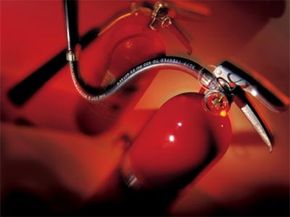Earthquake Supplies
A supply of food and water is essential for anyone in earthquake country. Keep water stored in plastic bottles. A three-day supply, made up of a daily ration of two quarts (1.9 liters) of drinking and two quarts for food and sanitation, should be considered a minimum guideline. Experts recommend changing this water supply every six months [source: San Francisco Chronicle].
As for food, keep on hand canned goods from various food groups (and a can opener). These provisions should be ready to eat or require minimal or no preparation. Make sure you have a stash of any required special foods, especially for family members who are sick or have particular dietary needs. Focus on nutritious items loaded with good calories, like nuts, peanut butter, crackers and granola. Avoid provisions that require anything more than a minimum amount of hot water, such as rice or pasta. Better to stick with instant coffee, tea or oatmeal. Your food supply should be replaced or restocked once a year. It can also be helpful to keep a stock of vitamins on hand.
Advertisement
A first-aid kit is very important to have in case anyone suffers an injury. Many earthquake-related injuries are minor ones, such as stepping on broken glass or twisting an ankle. You can buy a good premade first-aid kit or make your own; it should be filled with disinfectants, gauze, gloves, bandages, a thermometer and other such items.
You should also have a backup supply of any prescriptions, as well as a variety of nonprescription drugs, such as pain relievers, antacids and medications for abdominal/intestinal problems. Similarly, good sanitation is key, both for personal comfort and preventing disease. Make sure you have a cache of toilet paper, soaps, hand sanitizers, garbage bags, bleach and disinfectants.
We've taken care of nutrition, hydration and health, but clothes, tools and personal documents are also essential. A good sweatshirt and sturdy shoes will not only keep you warm if the heat doesn't work; they will also protect you from exposed nails, shards of glass or other hazards. If you require glasses, make sure they're near your bed in case you're there when a quake strikes, and keep a backup pair in your kit.
Your supplies should also include blankets, flashlights (with fresh batteries), tape, a wrench or other tool to turn off the gas, cash, a fire extinguisher and a battery- or hand-operated radio. Documents like passports, identification, family records, bank account information, wills and other essential items should be stored in a safe or somewhere else secure.
